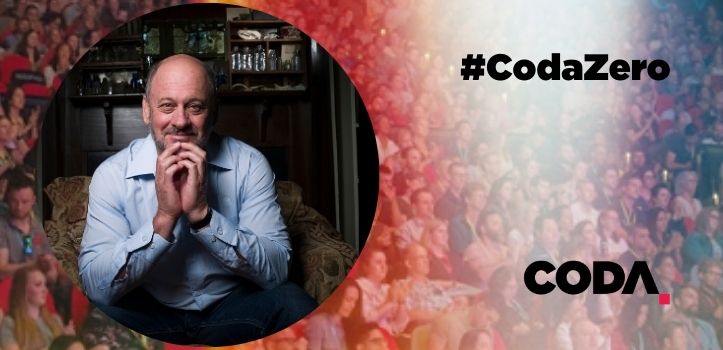Coda Earth: FULL EPISODE
The Coda community have identified the Climate Emergency as the most urgent threat to global health. There is overwhelming scientific evidence that the climate crisis will become catastrophic if we don’t take action immediately.
This episode of CodaZero Earth focuses on action stage one – ‘identify’ and lays the foundations for stage two – ‘examine’ (as set out in our Five Stage action process). We outline the urgency of the challenges that global healthcare faces and how as health professionals, we must sound the alarm for both our patients and for our children.
Conversation one dives into how gas is often positioned as a “safer transition fuel” when in fact it is completely unnecessary and a potential super-pollutant. The panel critically assesses the interrelationship of power, wealth and influence in government and how to overcome the sceptics in the fight for truth about the grave threat the #ClimateEmergency poses to health.
Then, we move on to how the climate crisis is exacerbating existing injustice and inequity, disproportionately impacting those patients without access to universal healthcare. Additionally, our younger population and our children are the most likely to be affected by the climate emergency, however, they have limited power of persuasion in the crucial decisions that we make today, which will impact on their tomorrow.
Conversation three defines what sustainable healthcare is. Health care accounts for 5-7% of the global carbon emissions. The healthcare community and supporting industries must commit to Corporate Social Responsibility goals and demand products, packaging and materials which have a minimal impact on the environment. We need to consider the super-cycle of high turnover, disposable waste and to challenge ourselves to consider alternatives such as reusable gowns. The overall target must be NetZero by 2050!
Finally, we examine how the pandemic response has shown us the way forward for climate action.
The first step of managing the pandemic was to stop the problem growing, similarly, the first step to combat the climate emergency is to stop the burning of fossil fuels. Then, we must build the capacity of our systems to adapt to the crisis, just as we built health capacity and finally we must search for the ‘climate vaccine’ which means drawing CO2 out of our atmosphere.
Our premise is first do no harm but “time is planet” and we need to get moving.

Tim Flannery
Tim Flannery is the 2007 Australian of the Year. In 2013 he founded, and is chief councillor, of the Australian Climate Council, Australia’s largest and most successful crowdfunded organisation. He is currently Distinguished Visiting Fellow in Climate Change at the Australian Museum, Sydney.
Flannery has taught at Harvard University, and has advised governments both in Australia and Canada. In 2007 he established and co-chaired the Copenhagen Climate Council, and in 2011 was appointed Australia’s first Climate Commissioner. He has served on the board of the Prince Albert II Foundation, WWF International and the Australian Wildlife Conservancy, and as an advisor to the National Geographic Society.
He has published over 140 peer-reviewed scientific papers and has named 25 living and 50 fossil mammal species. His 32 books include The Future Eaters and The Weather Makers, which has been translated into over 20 languages. He has made numerous documentaries and regularly writes for the New York Review of Books.
He speaks Bahasa Indonesia and Melanesian Pidgin and has over 20 years of experience as an explorer and biologist in New Guinea and surrounding countries.
Omnia El Omrani
Omnia El Omrani is a final-year MBBCh medical student from Egypt, currently working at Ain Shams University Hospital in Cairo. She has more than 6 years of experience in global health and student advocacy. She is currently serving as the Liaison Officer for Public Health Issues for the International Federation of Medical Students’ Association, representing the voice of 1.3 million medical students from 129 countries across the world in the advocacy for planetary health, climate change, and non-communicable diseases. She is also the organization’s focal point to the United Nations Framework Convention for Climate Change (UNFCCC).
Michelle Fox
Michelle Fox was named Corporate Vice President & Chief Medical Officer for Teleflex in February 2020. Michelle’s work has focused on organizational and systems development. This includes interactive medical education, as a means to making transformational change and supporting research that implements the best medical practices into bedside clinical care. She has lectured nationally and internationally on the impact of strong collaboration between Clinical and Medical Affairs and professional medical and nursing societies. She offers a rare blend of strong clinical practice and leadership, driven by her desire to improve patient outcomes, and tempered by a clear understanding of the challenges facing healthcare today. Michelle is passionate about advancing the cause of sustainable healthcare and corporate social responsibility in the medical device industry.
Kate Charlesworth
Kate Charlesworth is a public health physician based in Sydney. After working as a hospital doctor in Australia, Kate undertook much of her public health medicine training in the UK, including at the Sustainable Development Unit in Cambridge. The SDU is a world-leading unit tasked with reducing the carbon footprint of England’s National Health Service (NHS). Kate has subsequently completed a PhD about the characteristics of an environmentally sustainable health and care system. She currently works as a medical specialist in environmentally sustainable healthcare across Northern Sydney Local Health District and Sydney North Primary Health Network.
Forbes McGain
Forbes is an anaesthetist and intensive care physician at Western Health, Melbourne, Australia, and an A/Prof. (Medicine) at the Universities of Sydney, and Melbourne. Forbes remains passionate about making seemingly small environmental, financial and social sustainability changes to how we practice medicine, as well as that become magnified through every nations’ hospitals.
Forbes is currently collaborating with colleagues at the University of Melbourne and friends within the Doctors for the Environment (DEA) examining ways to make hospitals more sustainable and being stewards for earth’s extraordinary biodiversity.
Courtney Howard
Courtney Howard is an Emergency Physician in Canada’s subarctic, President of the Canadian Association of Physicians for the Environment, Chair of the advocacy subcommittee of the WHO-Civil Society Working Group on Climate Change and Health, is on the Steering Committee for the Planetary Health Alliance and is Policy Coordinator for ClimateCODA. She has led research on menstrual cups and wildfires, was the 2018 International Policy Coordinator for the Lancet Countdown on Health and Climate Change, and has participated in advocacy around divestment, carbon pricing, active transport, plant-rich diets, coal phase-out, hydraulic fracturing, wildfires, and the mental health impacts of climate change. Her mentors in mischievous change-making are her two hilarious daughters, with whom she can frequently be found dancing to indefensible pop music.





